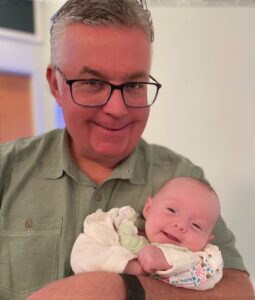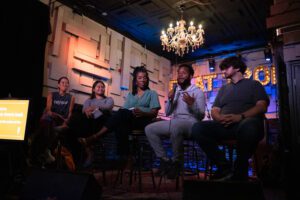By Eric Frederick, NC Local newsletter editor
I got to talk the other day with Bill Horner III as he adjusted to his new life without the Chatham News + Record — which he and his partners, Kirk Bradley and Chris Ehrenfeld, sold to North State Media last month.
As with any such transaction, there are a lot of things he can’t discuss publicly, so he and I mostly chatted as friends — about the rewards and, especially, the demands of the local news business and legacy print newspapers. At its core, his job as publisher and editor, with his duties in writing, editing, coaching, production, community relations and developing the business, was “just not sustainable,” he said. That was particularly so, he said, given his struggles in “bouncing back” from the toll the three-day production cycle was taking each week on his capacity to manage the non-newsgathering parts of the operation.
It was time to take the business side of the CN+R to the next level, he said, and “I didn’t think I was going to be able to get the ball across the goal line.”
When the partners bought the operation in 2018, Horner told me, “I saw it as a two- or three-year project for me … and we’ll either fail miserably, or we’ll get to a point where I can just pass the publisher/editor job to somebody else. And neither one of those happened. We didn’t fail. But we never got to that point where it was gonna be easy to pass it on.
“Our goal was to give Chatham County a really great newspaper for a really great market. And I think in a lot of ways we did that.
“People loved what we did … but just not enough of them.”

For now, Horner, who turns 60 in August and became a grandfather in March (that’s him in the photo with his new joy, Charlotte), says he’s taking better care of himself. He’s spending more time with family, writing (“which is my first love”), reading, getting back into cycling, traveling with his wife, Lee Ann, and looking for ways to stay involved in the news business, which is inevitable — it’s in his DNA.
Horner was at The Sanford Herald for more than three decades, and was publisher for the last 18 years. The Herald won first place in the NC Press Association’s General Excellence division four of his final six years there. (In three contest years so far with the News + Record, the paper has been third, second, and then, last year, first in its division in General Excellence.)
We did talk on the record about several topics — whether general-interest print newspapers are still viable, what he learned, where the CN+R strategy worked and where it didn’t, and what gives him pride. He was frank, and his insights useful. Here’s our chat, lightly edited for length and clarity:
EF: If you knew five years ago what you know now, what would you do differently?
BH: A lot.
One necessity is being more strategic and more intentional in audience engagement and readership growth. I think the kind of mindset that my partners and I had was that “if you build it, they will come.” We felt if we created a really strong news product, readers who had left the paper over the years would come back, and occasional or habitual readers would embrace what we did, as would advertisers … That’s just not the reality these days, and that was certainly reinforced in Table Stakes and Facebook Accelerator. But yeah, I would definitely be much more intentional and much more strategic in the whole audience funneling process.
I think another thing that we would do is, you know, we had a lot of success in digital growth. When we acquired the newspaper, there was no digital presence at all. There was a little slice of a web page where they put a PDF of the front page on the site. … So we did that well, but in the information overload era that we live in now, trying to be all things to all people with a print product is just darn near impossible to do. I think what we might have done differently that may have worked better is to focus more on specific types of content, instead of trying to cover everything — here’s news, here’s meeting coverage, here’s digestible information. I think it probably would have worked better to have a much more narrow focus on the kinds of news that we produced.
You know, COVID definitely hurt us because we were starting to get into producing and hosting events, which a lot of papers have had a lot of success with. When COVID hit, we had had a series of community conversations, and then we had two, two and a half years where you couldn’t do that. Of course, people are still not going back to gatherings — they’re doing them by Zoom. But I think that really hurt us too. Because, you know, a great way to demonstrate how serious you are about serving the community is by having meetings, having gatherings, having events, where you can talk directly to potential readers about what you want to do with the product, and also find out from them what they wanted from their newspaper. So that’s not necessarily something we could have done differently, but I think If COVID hadn’t happened, we would have had the opportunity to do that, and that was certainly part of our strategy.
EF: Was revenue part of the event strategy?
BH: Yeah, certainly.
EF: How much of your revenue was digital?
BH: Not nearly enough. I mean, we were certainly growing digital revenue, both from the website and from our newsletters. And we had a lot of digital-only subscribers. We really pushed digital subscriptions. You had a print option, and if you got print you got digital, but we also had a digital-only option. And we lost a fair amount of print readers who went digital because before, digital was not an option. Digital has a little bit higher cash flow — obviously we’re gonna make a little bit more profit on digital subscribers. But when your print number’s not growing the way your digital number is, your print advertisers aren’t capturing that gain. So we were a little bit of a victim of our own success there in growing digital in that we weren’t able to grow print at the same rate.
EF: You mentioned your uncertainty about the future of general-interest print newspapers. What do you think that means for local markets?
BH: I think the challenge is going to be relevance. You know, I think back to my early days at The Sanford Herald, when we were the only game in town and whatever we published was what people were talking about. Now between social media and email and all the different inputs that everybody has, the capacity and the appetite for information, including news, has certainly changed. The firehose, the constant stream of information coming at you, I think, impacts people’s appetite for it.
And I think there’s no question that how local news and information ranks among those choices has certainly gone down. It’s like — I’ve used this analogy for years — it’s like turning a kid loose in a grocery store. He’s not going to go to the produce department. He’s gonna go to the candy section. When I started in the industry, we used to be able to kind of force-feed our readers the kinds of stories that we felt like they needed — here’s the story about the county budget, here’s the story about the city budget, here’s the story about the revaluation, here’s the story about what’s going on the water plant. Nowadays people don’t care about that.
I had coffee this morning in Siler City with a reader … and he was telling me about the Chatham County commissioners and the budget folks, county administration, going around the county doing budget presentations — and no civilians, in his words, no residents were showing up. Nobody. And I told him, you know, last year, when they came to Siler City for their presentation, I was the only person there. It’s just not as important to most people. So I think it’s a question of relevance now, to figure out how to be relevant to your audience — to meet their needs, solve problems for them, but also be your market’s primary news source.
And that’s the problem because you have a lot of potential audiences as a news organization, which means lots of different interests — and you can only get them engaged if the content you’re producing is relevant. That’s hard when there are so many choices out there.
EF: What’s the best thing that came out of this endeavor?
BH: Well, I’ll tell you — the best thing for me, selfishly, was working with an incredible group of young reporters who loved what they were doing, who created great, great stories and content for us. And I think week in and week out, putting out the kind of newspaper that for me, as a newspaper addict, was the kind I’ve always wanted to read. And I think if you were in Chatham County, and you were looking for a really, really good newspaper, we delivered that. They weren’t always great papers. Some of them were marginal. But a lot of them were really, really good. And you know that feeling — you’ve been there — when you have a hand in creating something that’s really special, and you flip through the pages, it’s like, “This is just a great newspaper.” There’s just nothing like that feeling, and being a part of a team doing that week in and week out.
EF: Anything else you want to say?
BH: My partners, Kirk Bradley and Chris Ehrenfeld … those guys have just been a dream to work with. They love Chatham County. And this, for us, was never about money or profit. This was always about providing something for the community.
I was cleaning out my office today, and I had saved so many notes, you know? Readers sent me so many notes. When they were renewing their subscriptions, they would put in little sticky notes or index cards with so many positive comments saying we love what you’ve done with the paper, that we’re so lucky in Chatham County to have a newspaper this good.
I have one reader who’d see me and tell me, “I’m so mad at you.” I asked him why, and he said: “It used to take me only 10 minutes to read the paper. Now it takes me two hours!”
I’ll never forget that. We created a useful product, and in a lot of ways, it’s been the most fun I’ve had in my career.



